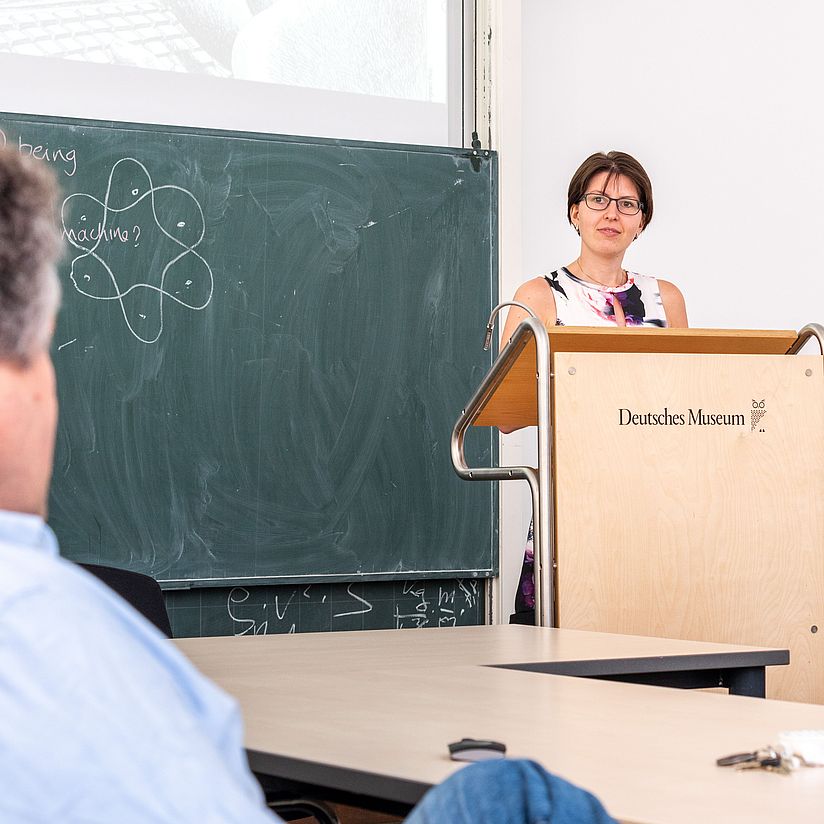
Bild: Deutsches Museum
Vortragsreihe
Montagskolloquium
In dieser Vortragsreihe berichten führende Technik- und Wissenschaftshistoriker über ihre Arbeit.
Das Forschungsinstitut des Deutschen Museums, die Professur für Wirtschafts-, Sozial- und Technikgeschichte der Universität der Bundeswehr München, die Professur für Wissenschaftsgeschichte der LMU, das Fachgebiet für Geschichte der Technik der TUM und der Oskar-von-Miller Lehrstuhl für Wissenschaftskommunikation der TUM veranstalten die Montagskolloquien.
Informationen:
Andrea Walther, Tel.: (089) 2179 -280
E-Mail: a.walther@deutsches-museum.de
Montagskolloquium im Sommersemester 2025
Zusammengestellt von Dr. Johannes-Geert Hagmann.
Beginn um 16:00 Uhr s.t.
Ort: Seminarraum Forschung I (im Bibliotheksbau)
Link zur Online Teilnahme:
Beitreten Zoom Meeting
https://zoom.us/j/95603412698?pwd=lWi9j5gEC1WV5VKIx8RbQOYKsaCJIQ.1
Meeting-ID: 956 0341 2698
Kenncode: 135860
Programm
05.05.2025
Dr. Silke Zimmer-Merkle
Von der Abenteuerlust zur Automatisierung – Fahrassistenzsysteme zwischen Technikgeschichte und Technikfolgenabschätzung
19.05.
Dr. Barbara Hof
Formen, Netzwerke und Bedeutung des europäischen Wissenschaftsaktivismus während des Vietnamkrieges
02.06.
Prof. Dr. Noyan Dinçkal
Im Modus der technischen Bewältigung: Prothesen, Arbeit und Leistung in der westdeutschen Kriegsfolgengesellschaft
16.6.
Prof. Dr. Dania Achermann
Von Zufall, Scheitern und Politik: Eine nicht-lineare Geschichte der CO2-Analyse
23.06.
Prof. Dr. Frank Trommler
Technikdenken in Amerika und Deutschland 1890-1930
07.07.
Prof. Dr.-Ing. Sonja Dümpelmann
Sounding Extreme Environments: Plants, Acoustics and Urban Space
21.07.
Dr. Aaron Gluck-Thaler
Classification as Explanation: The History of Pattern Recognition in Three Parts
Aufzeichnungen aus der Reihe "Modelle und Museen: Perspektiven aus Wissenschafts- und Technikgeschichte"
03.02.25: Understanding Electromagnetism: Carl Anton and Vilhelm Bjerknes' Hydromechanical Analogies
Roland Wittje | Museum of Cultural History, University of Oslo
20.01.25: ‘A solid, distinct, clear and palpable exhibition’. Three-dimensional Models between Engineering and Architecture in 19th c. Britain.
Simona Valeriani | Victoria and Albert Museum South Kensington, London
04.11.24: Im Dialog mit Holz, Metall und Stoff: Möglichkeiten und Grenzen bei der Untersuchung historischer materieller Modelle in Universitätssammlungen und Museen
Oliver Zauzig | Humboldt-Universität zu Berlin
Link zur Aufzeichnung:
https://zoom.us/rec/share/fMMhUv-lvWJ1wPsOxSNEj_oJv8YE2s28-Gta3F-SLUICTz5ML0qtfMJ6afSgaszp.AZEj0OKu3QJ6jQUP
18.11.24: Mentale Modelle in der Wissenschaftsgeschichte – eine unterschätzte Dimension der Forschungspraxis
Klaus Hentschel | Universität Stuttgart
16.12.24: Ist das Wissenschaft oder kann das weg? Überlegungen zur Relevanz mathematischer Modelle als Sammlungsobjekte
Anja Sattelmacher | Universitätsklinikum Hamburg-Eppendorf
Link zur Aufzeichnung:
https://zoom.us/rec/share/TJHSBPfLwWiPYP5MdLdOVsdT6WK_w-nqOYf66BVKnxWPTmAX62SHJEBUb0e6HC2E.JIA-fGQwHI_FZR_y
Aufzeichnungen aus der Reihe Global Envirotech Histories. Knowledge and Artifacts in Motion
April 22 – Roland Wenzlhuemer (LMU Munich / global dis:connect): “Dis:connectivity in Global History. A Tale of Two Islands.”:
May 6 – Lachlan Fleetwood (LMU Munich / global dis:connect): “Imperial Geography, Climate Science and the Habitability of the Silk Roads.”
May 27 – Frank Edward (University of Dar es Salaam): “''Tool of Empire' or a Technological Modernisation? The British Railway Musings in Tanganyika.”
June 10 – Ayushi Dhawan (Azim Premji University, Bhopal): “Many Lives of Obsolete Ships, Waste, Labor, and Livelihoods at Shipbreaking Yards in India.”
June 17 – Rebekah Higgitt (National Museums Scotland): “Using Digital Tools to Explore and Visualise the Colonial Histories of Scientific Instrument Collections”
July 8 – Cintia Velázquez Marroni (Instituto Mora, Mexico City): “From Natural History to Environmental History: Displacements in Mexican Museums and the Heritage Sector.”
Aufzeichnungen aus der Reihe Stoffgeschichte - Die Materialität von Wissenschaft und Technik
Dr. Rebecca Wolf; SIM Berlin
Materia Musica - Klang und Materialität im Instrumentenbau
Zum Video der Aufzeichnung
PD Dr. Jens Soentgen, Universität Augsburg
Stoffgeschichten aus Sicht der stoffgeschichtlichen Forschung: Ausgangspunkte, Methodik und ein Fallbeispiel
Zoom link zur Aufzeichnung des Vortrags
Prof. Dr. Friedrich Steinle, TU Berlin
System, Materialität, Praxis: Konflikte zur Farbenordnung im 18. Jahrhundert
Zoom link zur Aufzeichnung des Vortrags
Prof. Dr. Stefan Simon, SMB Berlin
Navigieren zwischen Erhaltung, Aut-hentizität und Zugänglichkeit - Alltag im Rathgen Forschungslabor
Zoom link zur Aufzeichnung des Vortrags
Prof. Dr. Andrea Funck, ABK Stuttgart
Was bewegt gegenwärtig die Konservierungs- und Restaurierungswissenschaft?
Beispiele und Möglichkeiten des Wissenstransfers zwischen Hochschule und Museum
Zoom link zur Aufzeichnung des Vortrags
Dr. Christian Zumbrägel, TU Berlin
Helium in Bewegung. Flüchtiges Speichern in der Stoff- und Infrastrukturgeschichte (1920-1960).
Aufzeichnungen der Vorträge aus der Reihe "Planetare Perspektiven"
Wir haben einige Vorträge der Reihe aufgezeichnet. Sie sind über den Zoom link abrufbar.
24.4. Wolfgang Wimmer: Strategie oder Zufall: Wie der Geschäftsbereich Planetarien bei Carl Zeiss entstand
22.5. Helen Ahner: Planetarien: Wunder der Technik - Techniken des Wunderns
17.7. Micky Remann: Das planetarische Theater. Eine subkutane Geschichte des Planetariums von Karl May bis zur 360-Grad Fulldome-Show
